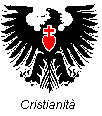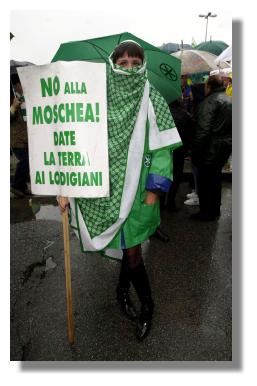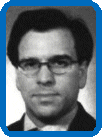Miguel Martinez March 29 2001
The following article may be hard to follow at times: the same names keep coming up in apparently very diverse contexts, and the result may be quite confusing. However this is useful to help us understand the way Alleanza Cattolica works; we may well call it a mutual aid society, made of a small number of people apparently involved in very different fields, who devote their energies to supporting each other.
This article also clearly shows the inconsistency of the defence of CESNUR's director, when he claims that his membership in Alleanza Cattolica is an entirely personal matter.
A note for non-Italian readers: The "Lega Nord" is a political party which until recently demanded independence for northern Italy, but has now joined the right-wing coalition with several other parties. "Alleanza Nazionale" is the former neo-Fascist party (this term is used here in a technical, not a derogatory sense) and another key partner in the right-wing coalition which may well win the elections coming up in May. "Forza Italia" is the party of Italy's media-boss Silvio Berlusconi. Massimo Introvigne is on the national board of the fourth main party of the right, the CCD; together with various splinter groups, these parties make up the right-wing coalition "Polo per le Libertà".
 On October 26, 2000, the Lega Nord party of Varese held a conference on "Europe-Islam: a Difficult Cohabitation". The speakers were Luca Pesenti ("Sociologist - University of Brescia", to be exact, a student doing his PhD) and Mario Vitali (Alleanza Cattolica and Acs - Aiuto alla Chiesa che Soffre, the Italian branch of ACN - Aid to the Church in Need). During the evening, a "report on religious freedom in countries with Islamic majorities" (La libertà religiosa nei Paesi a maggioranza Islamica: Rapporto 1998) was presented, published by ACS.
Only eleven days had gone by since the "leghisti" of another town had organized a lively demonstration to prevent the Muslims of Lodi from building a mosque. Here is how the story was told in the daily La Repubblica:
 There is no lack of anti-Muslim slogans. Of insults against Islam. Of mocking songs. The most polite say: "This land for the people of Lodi, not for the Muslims", "Padania [the Po valley area] Christian, never Muslim", "The shadow of the minaret shall never darken our bell tower", "Neither Moscow nor mosques, we need no insects [a play on words]", "If you don't jump you are a Muslim", "Allah is great and Ferrari's is small" [a sexual allusion to the mayor of Lodi]. […].
The speakers - along with Party President Gianfranco Fini - were Giovanni Cantoni, PierLuigi Zoccatelli and Alfredo Mantovano, AN's "officer for state affairs."
Giovanni Cantoni is the "national regent" of Alleanza Cattolica; magistrate Alfredo Mantovano is one of the main leaders of the same group - clearly the Lega is not the only party where Alleanza Cattolica is active.
People attending the meeting included Mariapia Garavaglia, former Christian Democrat minister, currently chairperson of the Italian Red Cross and a long term admirer, for reasons which are unclear, of the Reverend Sun Myung Moon; Dr Mario Cicala, a member of the Executive Board of the National Association of Magistrates. Finally, as in every major occasion, the whole event was overseen by Juán Miguel Montes Cousiño, director of the Rome office of Tradition, Family and Property (T.F.P.), the extremist organization of Brazilian landowners from which Alleanza Cattolica draws its inspiration (source: Cristianità n. 304). This was not, by the way, the first time that Mantovano and Cousiño were both present at the same public event.
Zoccatelli is a militant of Alleanza Cattolica (with a background as a member of the Crowleyite "Temple of Psychick Youth") and is also the most well-known figure in CESNUR after Introvigne. He is the editor of the series of books on "Religions and Movements" of the publishing house Elle Di Ci; Massimo Introvigne is the director of the same series. Books published in the series include works by Silvia Scaranari Introvigne, "collaborator" of Alleanza Cattolica as well as wife of Massimo Introvigne; by PierLuigi Zoccatelli himself; by CESNUR board member Jean-François Mayer; by CESNUR USA's James Gordon Melton; by Father Pietro Cantoni of Alleanza Cattolica, who happens to be the brother of Giovanni Cantoni (who in his turn is co-author of a book together with Introvigne).
 Silvia Scaranari Introvigne Having thus got an idea of who the speakers are, we can now return to the meeting of Alleanza Nazionale, which focused on the refusal to consider the Islamic requests. This refusal was expressed in significant words by the main speaker, Giovanni Cantoni, as he presented the study which set the guidelines of the convention:
A couple of months after the Rome convention, the moderated Newsgroup it.cultura.cattolica (where Alleanza Cattolica is constantly present) published a release by the association "In cammino":
We already met Zoccatelli and Cantoni at the conference of Alleanza Nazionale. In any case, Zoccatelli is also the publisher of the Regina Libani Informazioni, "bullettin of the Regina Libani Committee of Alleanza Cattolica for information on the situation in Lebanon, the Middle East and the Islamic world", which provides support to Lebanon's Maronite extremists and anti-Islamic organizations.
Alessandro Nicotra, a lawyer, writes regularly for Il Timone together with Introvigne (and Cammilleri and Menegotto…), and when he used to be the moderator of it.cultura.cattolica, he carefully censored every post remotely critical of CESNUR or Massimo Introvigne. Nicotra is not a militant of Alleanza Cattolica (unlike David Botti, who controls the other Catholic newsgroup, it.politica.cattolici).
Andrea Menegotto, of "Una Voce Grida...!" is the person who places CESNUR's releases on it.cultura.cattolica. According to Cristianità, # 303, January-February 2001, Menegotto is a militant of Alleanza Cattolica.
 Among his countless activities, as we saw before, Massimo Introvigne - "national consultore" of Alleanza Cattolica - is the director of the series "Religioni e movimenti" of the publishing house Elle Di Ci.
Andrea Pacini of the Agnelli Foundation works unceasingly to spread the idea of an "Islamic threat", though using extremely cautious language, and is often present at activities sponsored by Alleanza Cattolica and CESNUR; so it is no surprise to see that Elle Di Ci published a book of his. Andrea Pacini, besides being a scholar, also has a second job which he prefers not to mention when presenting himself as an objective scholar on Islamic issues. He is in fact the parish priest of the church of Saint Augustine in Turin (see "Nuovi preti per la Chiesa torinese", La Stampa, Sunday, June 10, 2001). Another curious item, which may of course be quite coincidental: the director of the Agnelli Foundation, recently elected to parliament on the ticket of the right-wing party Forza Italia, has the same surname: his full name is Marcello Pacini.
Menegotto, Zoccatelli and of course Introvigne all three belong to CESNUR.
Silvia Giuseppina Scaranari Introvigne, together with Father Augusto Negri runs the Centro Federico Peirone, the official body of the Turin diocese involved in Christian-Islamic relations (the website provides only two links, one not very surprisingly to CADR, another association run by Alleanza Cattolica). Scaranari Introvigne's booklet, L'Islam, 102 pages of the most extraordinary vacuity, was published by Elle Di Ci. At the CESNUR Conference in Turin, in 1998, quite symbolically, Mrs Introvigne was at the table where the books wer sold: publications by Cristianità (the magazine and official publishing house of Alleanza Cattolica) and by Elle Di Ci.
We also met Mario Vitali before, in his double role as militant of Alleanza Cattolica and member of ACS (Aiuto alla Chiesa che Soffre) or ACN (Aid to the Church in Need), an important Catholic association whose director in Italy is yet another militant of Alleanza Cattolica, Attilio Tamburrini.
Not to bore the reader, I shall stop here. I could list dozens more conferences, publications, meetings and other activities showing how deeply Alleanza Cattolica is committed to this field.
What can we make out of all this information?
First of all, Alleanza Cattolica manages - as usual - to combine a militant spirit with a certain degree of elegance. Expressions like "land fertilized by pig's urine" (and any associated risks) are left to the simple minds of Lodi; Alleanza Cattolica merely puts ideas into people's heads, providing the intellectual tools which allow the culturally underprivileged to give vent to their ethnical/religious hatreds. So much so that the intense anti-Islamic activity of Alleanza Cattolica is not even noticed: if you key "alleanza cattolica islam" into any search engine, you will almost only find material by Alleanza Cattolica itself.
Alleanza Cattolica simply repeats in a quiet voice all the reasons why Islam should be incompatible with the Italian legal system; and points out every cultural, ethnic or family conflict from Morocco to the Philippines involving Muslims in any way. This means spreading information which is not necessarily inaccurate: it is merely a matter of choosing carefully, in order to direct the attention of the listener or the reader in the direction which Alleanza Cattolica wants.
Now, it is interesting to note that this is the same strategy adopted by CESNUR: as we have carefully documented, CESNUR - with a few exceptions - avoids directly stating falsehoods, merely picking which elements to present.
If the methods are the same, the final aim seems however to be the opposite. CESNUR's policy focuses entirely around achieving recognition of certain US multinationals as "religions", with the relevant fiscal and legal privileges, by presenting only what we can call the "positive" side of such groups, and stressing their purely religious nature.
On the other hand, the policy of Alleanza Cattolica aims at denying the legitimacy of Islam as a religion by stressing its social and political aspects, and hence denying it access to the religious privileges enjoyed by other confessions in Italy .
Of course the methods that CESNUR applies to various cults could equally be used to legitimize Islam; vice versa, the methods Alleanza Cattolica applies to Islam could equally well be used to de-legitimize cults.
However - as anybody trying to make his way through the web of speakers and authors we mentioned above can see - CESNUR and Alleanza Cattolica are one and the same. Put quite simply, it is the same people who defend "cults" and attack Islam.
How does the Alleanza Cattolica mutual aid system work? A small but I hope quite clear example: on March 16 2001, a post appeared on it.cultura.cattolica, signed by "Una Voce Grida!...", which in its turn mentioned a CESNUR press release about a full page interview on the important Turin daily, La Stampa with the director of ACS (Thursday, March 15, 2001, signed by Marco Tosatti). The headline in La Stampa is "The Slaughter of the Christians: 165 thousand dead in 2000, from India to Sudan, from Egypt to Timor Est" - the image which comes to the readers' mind is certainly the Third World. But the article is reprinted complete on the CESNUR website under a new title: "Religious Liberty: Catholic 'Aid to the Church in Need' exposes 'worldwide persecution of Christians' and 'secular humanist Inquisition' in France".
Readers who do not bother to check personally are led to think that the people who write headlines for La Stampa listed the French government among the parties guilty of the "slaughter" (of course Tamburrini does speak of France in the text of the interview).
Few people probably also realize that "Una Voce Grida!...", Attilio Tamburrini and CESNUR are all three closely tied to Alleanza Cattolica.
Alleanza Cattolica's manner of working on the Islamic issue is characteristic. Their goal is not only to monopolize one side of the issue, but to define the very issue itself.
The case of CESNUR is quite clear - CESNUR does not appear as an excellent study centre for one side, that of the supporters of parareligious multinationals; rather, it presents itself as the only source for unbiased information on the issue of "cults".
Doing so in the case of cults is not so difficult, since the issue is virtually unknown. However, it is unlikely that Alleanza Cattolica will be able to monopolize Islamic studies in Italy. This does not prevent the organization from at least trying to do so, and this might explain the otherwise incomprehensible booklet by Silvia Scaranari Introvigne. This book is not one-sided; it is simply utterly superfluous, since it is only an imitation, without any academic or literary worth, of dozens of introductory booklets about Islam which can be found in any bookshop. I say this with the same detachment with which I say that her husband writes well. The only imaginable reason for such a waste of paper is that Alleanza Cattolica may want to have a sort of primer on Islam for its militants and friends, a text the contents of which are so bland that little can be said even against them.
There are several possible explanations. The first is that the fall of Communism has created a serious problem for Alleanza Cattolica, as well as for its Brazilian inspirers in Tradition, Family and Property, one of the most violently anti-Communist organizations in the post war period. To put it simply, movements like this need enemies.
There have also been various transformations in the Italian and European far right which are converging in the same direction. Xenophobia in Italy used to be quite a marginal phenomenon even among the right until a few years ago (as late as 1999, the Varese branch of the Lega donated an office of its own to the Islamic community to make a mosque). Many people on the "radical right" scene in Italy took a respectful approach to Islamic culture, some even converting, while others dreamed of unlikely "anti-One World" alliances.
One factor in the change has to do with party politics. The Lega was originally set up to fight what it considered the natural enemy of the people of northern Italy - southern red tape, southern politicians, southern mafiosi (and to no small degree, people from southern Italy in general). The coalition with the typically central-southern Alleanza Nazionale party, heirs of a century of Italian nationalism, was felt by many voters to be a betrayal of the Lega's ideals; so a common, outside enemy for all Italians certainly was needed - the Muslims ideally replacing the Southerners.
In recent years, among the militant far right, the influence of the French right (and the subcultural influence via Internet of US extremism) has led to an explosion of Islamophobia. At the same time, a large sector of Italian right-wing extremists, especially under the influence of Alleanza Cattolica, has suddenly discovered, if not an actual religious faith, at least a "Catholic and western identity" which defines itself basically as a rejection of immigration.
The words of Guillaume Faye, whom we mentioned above, are significant. Formerly a supporter of an alliance with the Third World, Faye today asks - in an article which was reprinted recently by Orion - whether, in order to contrast Islam and create a strong Europe, a competitor but not an enemy of the US,
A comedian like Faye should not be taken too seriously, but this sentence provides a good description of the way the far right in Italy is being Christianized - something which has more to do with politics than with belief. However, Faye's words are also reminiscent (of course unintentionally) of the curiously dual nature of Alleanza Cattolica and TFP, split between an attachment to the most traditional forms of Catholicism on the one hand, and a certain kind of esotericism on the other. But this is quite another matter.
At the same time, Alleanza Cattolica is trying to take advantage of certain trends inside the Catholic Church. It is no coincidence that Alleanza Cattolica repeatedly refers to the anti-Islamic stand taken by the bishop of Bologna. Islam actually poses a very serious problem for the Church, which has nothing to do with the fear of a jihâd: quite simply, it is afraid of losing its legitimizing power.
To give a simple example, soon quite a few Italians will have names like Abdul Rahman. They will probably be generally indifferent to Islam (already today in France, no more than 5% of immigrants go to the Mosques on Friday); but they will also be indifferent to the fact that the right-wing candidate in Italy, Silvio Berlusconi, boasts of having an aunt who is a nun, while the left-wing candidate Francesco Rutelli boasts of having been "the Mayor of the Papa Boys" when he governed over Rome during the recent Jubilee.
This problem does not arise with so-called "cults". First, because they their following is much smaller than that of Islam in Italy. Second, because in any case they share certain "Western" values. One must not forget that Alleanza Cattolica is more a political than a religious organization, and its main desire is to set up a free market economy; this is why the model for this officially Catholic organization actually is taken from the United States, which are culturally "Protestant."
A final note concerns the common perception of activities like those of Alleanza Cattolica. Recently, a slightly deranged Catholic extremist, named Andrea Insabato, set off a bomb in front of the offices of a small left-wing daily in Rome, injuring himself severely in the process. Attilio Tamburrini, on the other hand, as we have seen, managed to get nearly a full page in a much more influential daily. There can be little doubt which of the two is more successful in promoting a crusading spirit; yet many more Italians have heard of Insabato than have ever heard of Tamburrini.
|